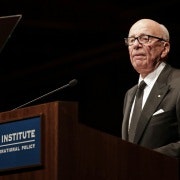Will Abbott's competitive agenda truly deliver?
With the release of the Tony Abbott-chaired National Industry Investment and Competitiveness Agenda pushed back beyond August, the local start-up sector will need to sit on its hands a while longer to find out if the Coalition government has a bigger vision for its development.
The Competitive Agenda taskforce was set-up in December and was to have reported to Cabinet by June. It was delayed to the end of August and now may be delayed again, as the PM has been focused on dealing with the aftermath of the Malaysian Airlines outrage in the Ukraine.
When it finally lands, the Competitiveness Agenda should make fascinating reading for the local tech-enabled start-up and IT sectors.
An optimist might say the agenda will be this government’s big “reveal” in terms of its attitude to the local tech sector (although the pessimist will tell you the reveal already occurred in Joe Hockey’s dismal budget.)
Regardless, it is fascinating, and here’s why.
First, it is chaired by the Prime Minister, which is a pretty big deal. If there are any industry development initiatives for tech to come out of a government – any government – you want the PM announcing them.
We know that changes to tax treatment of employee share options were being considered as part of the competitive agenda, and we know through media leaks that those changes will go ahead.
We also know that the taskforce has looked at new commercialisation options. Both of these issues may end up as component parts of Industry Minister’s Ian Macfarlane’s Entrepreneur Infrastructure Program, but having them announced through this taskforce is a good thing.
Secondly, the taskforce is fascinating for its composition. Along with Chairman Abbott, it is comprised of the Treasurer Joe Hockey, Industry Minister Macfarlane, Trade and Investment Minister Andrew Robb.
That’s a politically beefy bunch of blokes, if ever there was one. The Competitive Taskforce was set up in the wake of announcements on the shuttering of the car industry in Australia – so its initial splash was skewed toward the future of manufacturing in this country.
Turnbull goes MIA
But even in that context, it seems unbelievable to me that the minister with responsibility for “national policy related to the digital economy” – Malcolm Turnbull – is not a member of that taskforce. And regardless of the craziness of the discourse around the National Broadband Network (NBN), it’s still the nation’s biggest infrastructure project currently on the go.
All of this is ancient history, of course, given the taskforce was formed in December. But Turnbull remains the most articulate voice in government on broader technology, including a whole raft of eGovernment, procurement and service delivery issues, to say nothing of the impending impact of technological disruption to the Australian services sector. And then there is the whole broadband thing.
These are competitiveness cornerstone issues. Still, if this government is not even going to tell its Communications Minister about its data retention plans before announcing it to the media, it’s not likely to give him a seat at an important table.
I wrote a column last year shortly after the election that asked “Who will lead the Coalition’s ICT agenda?” I queried how the three powerful ministries of Finance, Industry, and Communications would work together in this government in relation to the tech sector. At this point the answer is not particularly well.
Ian Macfarlane and Finance Minister Matthias Cormann have expressed little and no interest respectively, while Mr Turnbull has been put in a box. Politics is getting in the way of good outcomes for tech.
A shiny new agenda
Regardless, we will soon have a shiny National Competitiveness Agenda.
Look for new commercialisation support mechanisms (that go beyond those announced as part of the Entrepreneur Infrastructure Program), new work visa arrangements for tech companies (including the possibility of entrepreneur visas), and look for higher-risk investment incentives to drive the stalled venture capital in this country.
But mainly look for industry programs aimed at advanced manufacturing, and re-skilling and re-tooling initiatives for the automotive parts sector.
And of course look for the changes to the tax treatment of employee share options and the liberalisation of rules around crowdfunding.
James Riley has covered technology and innovation issues in Australia and Asia as a writer and commentator for 25 years. Read more from James Riley at www.InnovationAus.com or follow him @888riley on Twitter.
















